
Why Our IQ Tests?
 It's the easiest way to learn your IQ score and which average IQ class you're in.
It's the easiest way to learn your IQ score and which average IQ class you're in.
 You can discover your true cognitive potential and uncover your hidden talents.
You can discover your true cognitive potential and uncover your hidden talents.
 Unlike traditional IQ tests, it's quick, and you can learn your results instantly.
Unlike traditional IQ tests, it's quick, and you can learn your results instantly.
 It gives decent statistics about your problem-solving speed and time management skills.
It gives decent statistics about your problem-solving speed and time management skills.
 It provides comparative and detailed reports on your age group.
It provides comparative and detailed reports on your age group.
 Your results and certificate are archived safely. So you can access or share them again in the future.
Your results and certificate are archived safely. So you can access or share them again in the future.
 According to your test results, it gives you golden advice to improve your IQ Score.
According to your test results, it gives you golden advice to improve your IQ Score.
 Your data is yours, and they are always well protected.
Your data is yours, and they are always well protected.
What Is IQ? A Simple Explanation for Everyone
IQ, short for Intelligence Quotient, is a numerical measure of a person's intellectual ability. It represents a person's cognitive abilities, problem-solving skills, and understanding of complex ideas.
But what exactly does it mean?
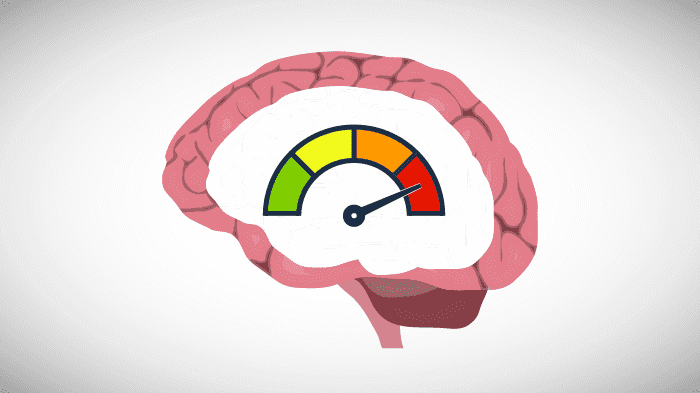
IQ is a numerical representation of a person's intellectual abilities. It's like a score that reflects how well someone can solve problems, understand complex ideas, and learn from experience.
Imagine your brain as a super-efficient computer. IQ is like the processor speed of that computer; it indicates how fast and accurately your brain can process information.
The IQ score can be calculated with the formula of IQ = (intelligence age/actual age) x100.
Learning your IQ score with MentalUP’s Culture Fair IQ test is easy. MentalUP IQ gives reliable results based on reference values. Unlike traditional IQ tests, it's quick, and you can learn your results instantly.
Moreover, according to your test results, the MentalUP IQ Test gives you golden advice how to increase IQ Score.
What Is an IQ Test? How to Test IQ?
An IQ test is essentially a smartness test. It’s designed to assess a person’s intellectual abilities and provide a numerical representation of their intelligence.

These tests consist of questions and tasks that evaluate various cognitive skills, such as problem-solving, critical thinking, and pattern recognition.
IQ tests help psychologists and educators understand an individual's mental agility and potential. By analyzing the responses to these questions, professionals can determine a person’s IQ score, indicating their level of intellectual capability.
Here is a short list of the most common IQ tests (intelligence quotient test), besides MentalUP’s online IQ test that you or your children may want to take:
- Stanford-Binet (SB-V)
- MentalUP IQ Tests
- Wechsler Adult Intelligence Scale (WAIS-IV)
- Wechsler Intelligence Scale for Children (WISC-R) (ages 6 to16)
- Leiter International Performance Scale
- Mensa IQ Test
History of IQ Tests
You may wonder, “Who invented the IQ test anyway?”.
For the first time in history, dated around 2200 B.C., Chinese rulers selected their servants according to some examinations. The Ancient Egyptians also used similar kinds of methods.
However, the first studies of modern IQ tests began in the late 19th century. Alfred Binet and Theodore Simon developed a system for testing IQ in 1905.
According to this system, the average intelligence scores of people within certain age groups were determined, and people's success was evaluated based on these scores.
German scientist L. Wilhelm Stern coined the term IQ (Intelligence Quotient). The system Stern had developed was based on generating the score by calculating the ratio of mental age and physical age of the test maker.
Modern intelligence quotient tests are still based on these variables. And the term “IQ” is still widely used.
Where to Take An IQ Test & Intelligence Test?
Although intelligence quotient tests can be conducted in a collective environment, it is recommended that they be conducted in designated places to be applied in private areas first. Where and how to take the test depends on the type of intelligence quotient test.
Some intelligence quotient tests are practical and some are completely on paper. For example, cards and cubes are frequently used in performance tests. Therefore, the intelligence quotient test depends on which mental field is being tested or the test administered.
IQ tests should be taken under the supervision of a specialist in a clinic if possible. The testing environment where the IQ test is conducted is really important, and it is necessary to remove any distracting materials.
Children who take IQ tests must be focused on the test without any distractions. For instance, children should not feel hungry or need to go to the bathroom during the test.
You can learn more about the most popular intelligence tests in the world in the rest of the article, but these tests may also have sub-tests. Some IQ tests may require testing different variables, such as visual, analytical, and auditory IQ tests, and so on.
MentalUP IQ Test is one of the best and most effective ways to learn your IQ score from anywhere, anytime. It also informs you of the areas that need improvement by comparing your results to millions of other users!
It doesn’t require reading or writing skills but is suitable for all ages. MentalUP IQ Test has been taken by 5+ million users from all around the world so far.
What IQ Test Types Are There?
Here’s a breakdown of the most common IQ test types, including real IQ tests, IQ tests, official IQ tests, online IQ tests, free IQ tests, and IQ quizzes tailored for adults and individuals of all age groups.
1. Real IQ Tests
Real IQ tests, or standard IQ tests, are administered by licensed psychologists in controlled environments.

They are comprehensive assessments of a person's cognitive abilities and are widely accepted as accurate measures of intelligence. Real IQ tests provide a detailed analysis of various skills, including mathematical reasoning, logical thinking, and language proficiency.
2. Official IQ Tests
Official IQ tests are standardized assessments administered by licensed professionals or certified testing centers.
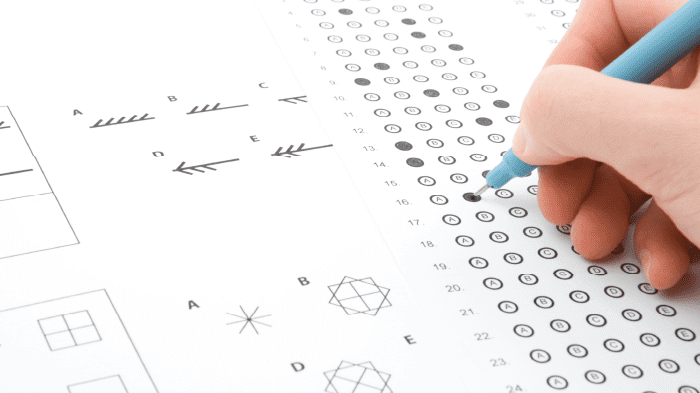
These tests adhere to strict protocols and are considered authoritative measures of intelligence. Official IQ tests are often used for academic, clinical, or employment purposes, providing credible results recognized in various fields.
3. Online IQ Tests
Online IQ tests are available on numerous websites and can be taken from the comfort of one's home.

Online IQ tests vary in quality and accuracy, so choosing reputable platforms is essential to ensure reliable results. They typically cover a range of cognitive skills and provide instant feedback, making them convenient options for those seeking a quick assessment.
Discover MentalUP's online IQ test - quick, easy to use, and culture-free. More than 5 million people worldwide have taken the test, gaining valuable insights. Take advantage of precise and convenient cognitive evaluation online!
4. Free IQ Tests
Free IQ tests are accessible online at no cost. While they offer a basic evaluation of cognitive abilities, their accuracy may vary.
Free IQ tests often serve as introductory tools, giving individuals a glimpse into the testing process. However, investing in professional assessments or official IQ tests is recommended for more precise and reliable results.
5. IQ Quizzes
IQ quizzes are informal, fun tests available online. They are designed for entertainment and educational purposes rather than professional evaluation.
IQ quizzes often feature engaging questions that challenge problem-solving skills and general knowledge. While enjoyable, they should not be considered accurate representations of one's true intelligence.
In conclusion, the diverse range of IQ test types allows individuals to explore and understand their cognitive abilities in various ways. Choosing the right type based on the intended purpose is crucial when considering an IQ test.
What Are the Most Popular IQ Tests
- Stanford-Binet (SB-V): The Stanford-Binet IQ test measures the ability of verbal reasoning, abstract/visual reasoning, quantitative reasoning, and working memory.
- MentalUP Online IQ Tests: Discover the world's best iq tests online – taken by 5+ million worldwide! Unlock your cognitive potential with our free online IQ tests—no reading or writing skills are required.
- Wechsler Adult Intelligence Scale (WAIS-IV): The IQ test has two main categories. The verbal part includes several tests to measure verbal reasoning, vocabulary ability, auditory perception, and long-term memory. On the other hand, the performance category in this intelligence test covers visual attention, visual perception, and 3D perception.
- Wechsler Intelligence Scale for Children (WISC-R) (ages 6 to 16): It is similar to WAIS. The WISC includes questions for kids to understand easily.
- Leiter International Performance Scale: Evaluates nonverbal cognitive abilities, which makes intelligence tests an ideal format for children with speech and hearing disorders.
Some tests are visual IQ tests or memory tests, and some only measure kids or adults' intelligence.
Cards and diagrams are the main tools for performance tests, and children are expected to find the right answer from these cards or diagrams as quickly as possible. On the other hand, verbal intelligence tests measure linguistic ability. In reasoning ability tests, children are supposed to find the best solutions for the given cases
In Which Cases Should An IQ Test Be Taken?
Intelligence tests are usually carried out for two purposes but can also be taken out of curiosity or for other reasons.
- Case 1: An intelligence test is performed if the individual seems inadequate compared to his/her peers.
- Case 2: An intelligence test is performed if the individual shows superior ability or intelligence potential compared to his/her peers.
Suppose the IQ test is taken due to inadequacy. In that case, the following signs should be observed:
- Having problems such as incompetence in academic performance, inadequate literacy skills, and slow learning.
- Feeling uncomfortable in a social environment, requiring someone's assistance for personal care and needs.
If the individual has characteristics of gifted children or adults, you may have observed some of the signs listed below:
- Excessive curiosity, remembering everything precisely, learning, and making plans quickly.
- They have a very wide range of vocabulary, full command of difficult concepts and terms, and the obvious superiority of language skills compared to their peers.
- Having a high level of imagination and creativity.
"Remember that the results of IQ tests may not always give a definite answer. Therefore, neither parents' confidence in their children nor children's confidence in themselves should be impaired."
How Do You Choose the Right IQ Test for You?
Selecting the appropriate IQ test is crucial for accurately assessing your cognitive abilities. With the abundance of options available, making an informed decision is essential.
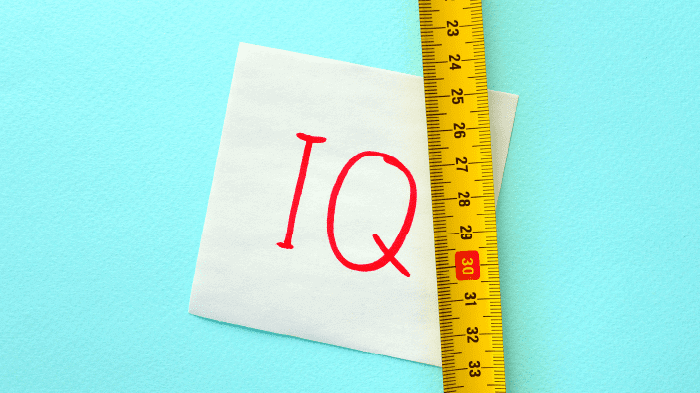
Here are some key factors to consider when choosing the right IQ test, especially if you are an adult seeking online options:
- Credibility and Source: Opt for IQ tests from reputable sources. Look for tests designed by licensed psychologists or renowned institutions. These tests are more likely to provide accurate and reliable results. When searching online, use keywords like "online IQ test free" or "free IQ test online" to find legitimate options.
- Purpose: Determine the purpose of taking the IQ test. Are you seeking a general understanding of your cognitive abilities, or do you need an official assessment for academic or professional reasons? Different tests cater to various purposes, so choose accordingly. If you are an adult, look for IQ tests specifically designed for adults to ensure relevance and accuracy.
- Format and Content: Consider the format of the test. Some tests are time-based and consist of multiple-choice questions, while others might be more interactive or adaptive. Assess your comfort level with the format. Additionally, check the content areas covered by the test. Ensure it aligns with the aspects of intelligence you wish to evaluate, such as logical reasoning, mathematical skills, or linguistic abilities.
- Feedback and Interpretation: Look for tests that provide detailed feedback and interpretation of your results. A comprehensive analysis helps you understand your strengths and areas that need improvement.
- Privacy and Security: Ensure that the platform offering the test values your privacy and data security. Reputable websites will have clear privacy policies and secure connections to protect your personal information.
- Reviews and Recommendations: Read user reviews and seek recommendations from reliable sources. Hearing about the experiences of others can guide you in making an informed choice.
Why Is It Important to Test Your IQ?
Testing your IQ serves various essential purposes, extending far beyond mere curiosity. Here’s why understanding your intelligence quotient is significant:
- Diagnosing Intellectual Disabilities: IQ tests play a vital role in diagnosing intellectual disabilities. Identifying challenges early allows tailored interventions and support, enhancing the individual’s quality of life.
- Education and Career Planning: IQ tests provide valuable insights into learning styles and strengths for students. This information guides educators in creating customized learning experiences. Understanding your IQ can also steer career choices, ensuring alignment between your abilities and chosen professions.
- Self-Discovery: Taking an IQ test can be a journey of self-discovery. It reveals your cognitive strengths, prompting you to explore and enhance various skills, leading to a more holistic personal development.
- Motivation: Your IQ score can serve as a motivational tool. It offers a benchmark, continually inspiring you to improve your problem-solving and intellectual skills.
- Gaining a Competitive Edge: A higher IQ can provide an edge in competitive academic and professional environments. Enhanced cognitive abilities can lead to better decision-making and innovative problem-solving, setting you apart from your peers.
- Identifying Intellectual Giftedness: IQ tests are instrumental in identifying intellectual giftedness. Recognizing exceptional abilities early allows for specialized educational programs, nurturing the talents of gifted individuals.
In summary, understanding your IQ is multifaceted. It aids in personal growth, educational and career planning, research advancements, and fostering a deep understanding of oneself. Moreover, it empowers individuals to navigate life’s challenges, capitalize on their strengths, and continuously strive for intellectual excellence.
What Are IQ Score Ranges? IQ Score Table
IQ ranges are crucial to interpreting Intelligence Quotient scores. They help us understand a person's cognitive abilities and their standing on the intelligence scale. The ranges categorize people into varying levels of intellectual capability.
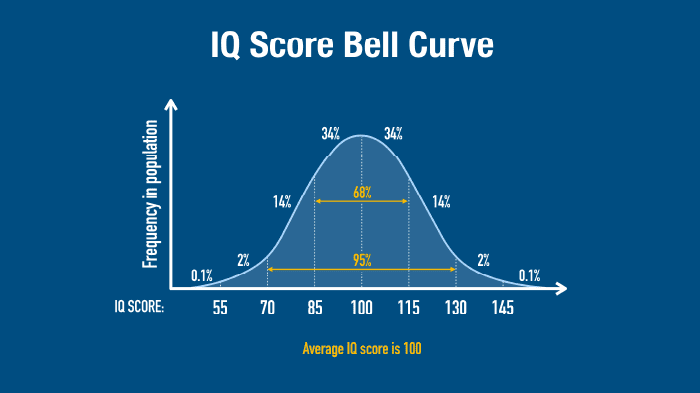
The IQ score range typically starts from around 70, indicating below-average intelligence, and goes up to 130 or more, representing above-average intelligence. Here’s a breakdown of the IQ levels within this range:
| IQ Score | Correspondence |
|---|---|
| 145 - 160 (Very Gifted or Highly Advanced) | Individuals in this IQ range demonstrate exceptional intellectual abilities and cognitive prowess. This category represents the upper echelon of intelligence, where individuals exhibit profound understanding, advanced problem-solving skills, and remarkable creativity. |
| 130 - 144 (Gifted or Very Advanced) | These individuals typically demonstrate exceptional intellectual capabilities across various domains, including but not limited to academics, problem-solving, creativity, and critical thinking. |
| 120 - 129 (Superior) | Individuals within this range typically demonstrate superior cognitive abilities compared to the general population. They often excel in tasks requiring complex problem-solving, abstract reasoning, and critical thinking. |
| 110 - 119 (High Average) | Individuals scoring within this range typically demonstrate cognitive abilities that fall within the upper echelons of average intelligence. They often possess strong problem-solving skills and exhibit above-average reasoning abilities. |
| 90 - 109 (Average) | Individuals scoring within this range often demonstrate competence in everyday tasks and can typically handle the demands of school, work, and social situations adequately. |
| 80 - 89 (Low Average) | Individuals scoring in this range may possess some competency in the assessed skills or abilities but may also exhibit areas where improvement or development is needed. |
| Below 70 - 71 (Borderline Impaired or Delayed) | Individuals in this range might face challenges in tasks requiring complex problem-solving or abstract thinking. They often need additional support in learning and everyday activities. |
| 55 - 69 (Mildly Impaired or Delayed) | Individuals falling within this range may face challenges in learning, problem-solving, and adaptive functioning compared to their peers. |
| 40 - 54 (Moderately Impaired or Delayed) | Individuals falling within this range may exhibit moderate difficulties in various areas such as communication, social interaction, and daily living skills. They may require substantial support. |
IQ scores can improve with education, mental stimulation, and continuous learning. They are not fixed.
What Is a Good IQ Score?
Typically, it is hard to say what score is good or bad for IQ tests because every IQ test has its scale to measure intelligence.
For example, the Stanford-Binet Intelligence Scale ranges from 40 to 160. Over 110 is accepted as a high average, so it can be considered a good IQ score if people get +110.
Generally, IQ scores are categorized into different ranges, as we discussed earlier. An IQ score within the range of 85 to 115 is considered average and typical for most of the population. However, if we talk about what is considered a high IQ, it usually falls above 130.
An IQ score above 130 is often considered high, indicating exceptional intellectual abilities.
❗️ Remembering that IQ scores only measure a small part of intelligence is vital. Creativity, emotional intelligence, and practical skills contribute to a person's overall abilities.
So, even though possessing a high IQ is noteworthy, it's crucial to identify and develop other talents and skills that make a person unique and capable in diverse aspects of life.
The People Who Have the Highest IQ Scores in the World
FAQ (Frequently Asked Questions)
Here are the answers to the most asked questions about IQ and IQ tests:
Is IQ Genetic?
Yes, IQ can be affected by both genetic and environmental factors.Does Your IQ Change?
Yes, your IQ test scores can change over time. The most volatility in IQ scores is in childhood, mostly adolescence, and it stabilizes as you age.Can IQ Be Increased?
There is research that suggests that it's possible to raise your intelligence through certain brain-training activities. Training your memory, executive control, and visuospatial reasoning can help you make your way up the IQ test scale.
MentalUP is one of the most effective ways to help train the mind with cognitive exercises to help improve children’s and adults’ mental ability and intelligence.How Can I Improve My IQ?
According to the researchers, IQ level is open to improvement, but it would only be minor progress for adults. However, children have advantages because they can still train their minds and increase their cognitive skills.
Developing working memory, eliminating stress factors, and challenging your brain with apps like MentalUP are essential for that aim.Are IQ Tests Accurate?
It can accurately assess specific cognitive abilities when well-designed and administered properly. However, it's essential to note that no test can capture the entirety of human intelligence.What Kinds of Questions Are on an IQ Test?
Everyone wonders, “What is my iq?” but not every iq test can calculate the IQ level.
A successful IQ test has to be designed with logic, verbal comprehension, and perceptual and mathematical reasoning questions. The question may contain anagrams, vocabulary terms, and pattern recognition to test all the abilities.Can I Retake Online IQ Tests if I'm Not Satisfied With My Score?
You can retake an online IQ test if you're unsatisfied with your score. Many online platforms allow unlimited retakes, recognizing that various factors, such as distractions, can impact your performance.
Retaking the test under focused conditions might reflect your abilities more accurately. Remember, practice and concentration can significantly influence your results.Can I Practice IQ Tests?
Yes, you can absolutely practice IQ tests to improve your cognitive abilities and problem-solving skills. Several resources, including free online IQ tests, allow individuals to practice and enhance their intelligence quotient.
Regular practice helps you familiarize yourself with the types of questions commonly found in IQ tests and sharpens your mind, making you more adept at solving complex problems.What IQ Is Considered a Genius?
A score over 160 is considered a genius IQ.What Was Einstein's IQ?
As we mentioned before, Albert Einstein’s IQ score was about 160, the highest score on the IQ test scale. However, did you know that he had Dyslexia (a specific learning disorder)?Who Has the Highest IQ?
Ukrainian-American Psychiatrist William James Sidis is alleged to have had an IQ of 275 as the highest IQ in the world. That is over the charts on the IQ test scale!Is 120 IQ Good?
The average score on an intelligence test is 100. As most people fall within the 90-109 range, an IQ score of 120 is above average.
You have learned everything you need to know about intelligence quotient tests. 👏 Now it’s time to test yourself or your children with a real intelligence test!


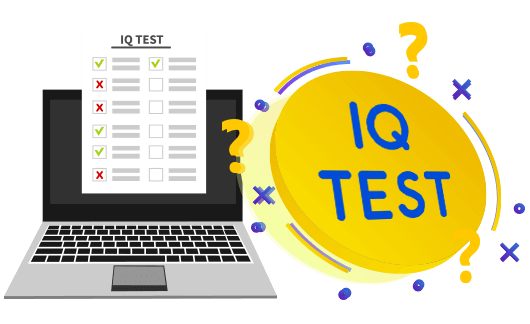
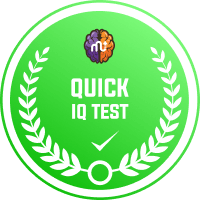
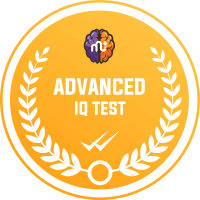
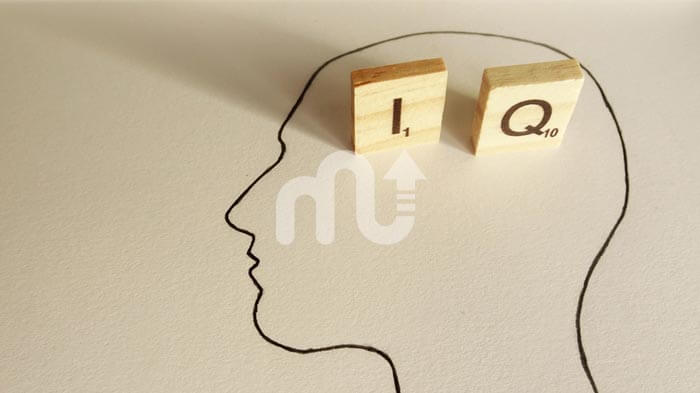
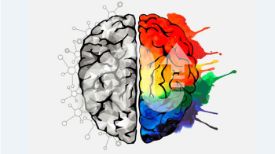

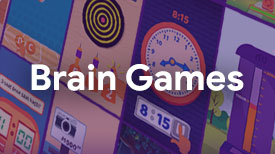
American writer Marilyn vos Savant : 228
Korean Physicist Kim ung-yong : 210
British Physicist Isaac Newton : 190
French Writer Voltaire : 190
Russian World Chess Champion Kasparov : 190
Italian Scientist and Painter Leonardo da Vinci : 180
German Musician Goethe : 179
German Theologist Martin Luther : 170
Italian Astronomer Galilei : 165
German Musician Beethoven : 165
German Physicist Albert Einstein : 160
British PhysicistStephen Hawking : 160